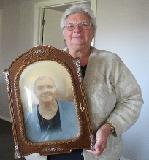Rosemary Grace Bruce-Mullins is Committee Member and Member of the Research Team at the Wentworth Historical Society Inc, Australia
As a local History Society member digital preservation of records provides a multitude of benefits.
An experience where the local town hall, that housed the history society collection, was firebombed, and thankfully saved, made us aware of the reality of losing the collection, and all the information it contained.
While digitalisation does not replace the feel and nostalgia of original documents, the information can be preserved and maintained. Multiple copies made and online access provided to members using online storage such as OneDrive.
When approaching digitisation we don’t all have top of the line equipment, but we can make good quality copies with what we have. I have used a camera on a tripod driven remotely with an app on a tablet. This saves movement when taking the picture and you can check the image on the tablet screen. For odd-shaped negatives, we initially used a LED Light in a casserole dish with opaque Perspex over it, photographed and then inverted with a photo manipulation program. Use the best quality settings you can or that you r storage facility will allow. Many desktop scanners have standard negative and slide options, and portable hard drives are affordable.
There is much information online regarding the most suitable format and how to go about digitising your records. The most important, in my opinion, is to have backups. Maintain a copy of your files as a master, have working copies and keep them all up to date. Many History group’s income is derived from membership and research request fees so sharing information online can be a great benefit. To encourage membership growth.
Another important aspect of digitising is to catalogue what you have, the group I belong to now, Wentworth Historical Society Inc in the far west of NSW has a rigorous accession process. All donations are recorded, individually numbered, photos are scanned, and contents identified, documents are indexed so that information required to answer queries from researchers can be readily located.
With recent restrictions on accessing premises and physical documents, having digitised files have enabled us to maintain a service to researchers and to continue with the societies work and projects.
Digitisation for local history groups does not have to be a daunting process, once you have made the decision to digitise, start with new acquisitions and work through your existing collection.
